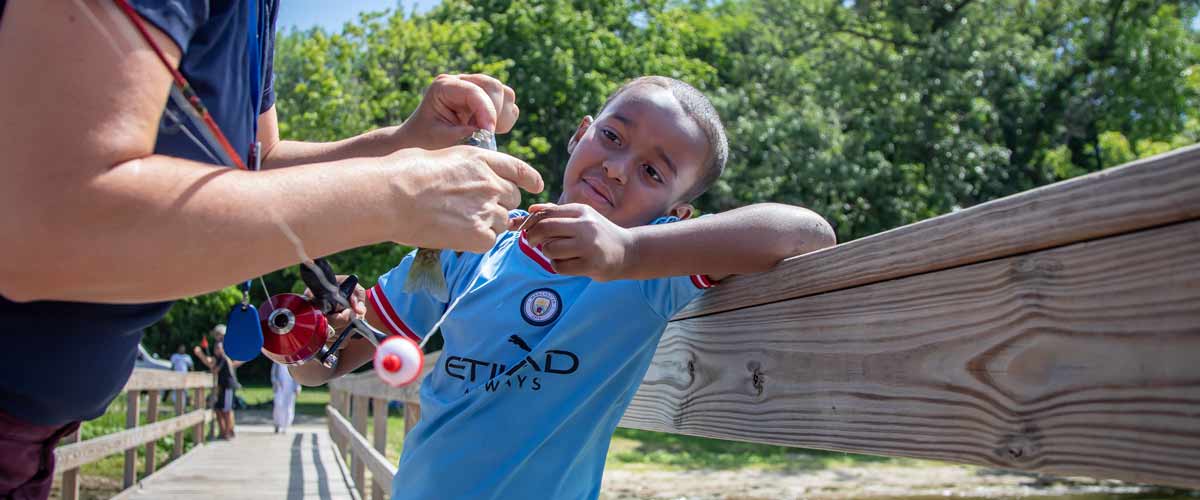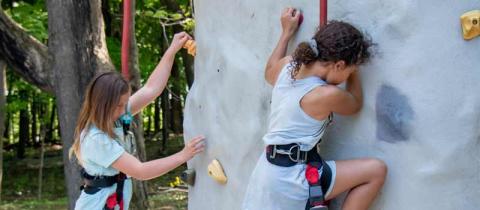
Education Programs at Baker Outdoor Learning Center
Baker Outdoor Learning Center offers an array of different programs to choose from, no matter what time of year you visit or what your group is interested in! The Baker Outdoor Learning Center focuses on field trips for those in 3rd grade or higher, and the curriculum supports certain Minnesota K–12 Academic Standards.
Learn more about our offerings below. Program descriptions are organized by seasons and their topic areas, with additional information on scout-specific programming. For a high-level overview of programs, their topic areas, seasonal availability, and other requirements or restrictions, view this table.
If you don't find a program that fits your group's needs, contact us at 763-694-7724 or email us to have our professional staff develop a program tailored to your group.
Ready to reserve? Call us at 763-694-7724 or email us.
Year-round
The following programs, organized by topic area, are available for selection in any season.
- Natural History
Discovery Hike
Weather and time of year affect what organisms we can find at the Baker Outdoor Learning Center. This lesson allows space for students to use science practices and tools with a subject of the naturalist's choosing — potential subjects include plants, insects, fungus/lichen, and reptiles and amphibians. During this class, students practice science skills like making detailed observations, asking questions and sharing information with peers.
Flight
Explore Bernoulli's Principle and Newton's third law to explain why objects can fly. Through hands-on experiments, like pop-bottle rockets, students will be introduced to three types of flight.
Forests: Tree ID
Discover the unique natural history of the Baker Park forest during a hands-on hike. Learn about the inner workings of a tree and use a dichotomous key to identify local trees.
Naturalist Hike
Take a guided hike through the woods and meadows of Baker Park. See what wildlife or animal signs you encounter.
Owls
View a stuffed owl and learn about the owls of Baker park. Learn about nocturnal animals, predators, adaptations and food webs. Then, dissect a sterilized owl pellet, and see what the owls have been eating!
Predator-Prey Game
This large group game of ultimate survival is a fun and exciting way for students to learn the basic needs for survival and the dynamics of a food chain by assuming the roles of various animals. Survival depends upon understanding the predator-prey relationship and overcoming limiting factors within the environment.
Skulls
Discover the identifying characteristics of skulls. Use a dichotomous key at skull stations to identify some of the animals that live in Baker Park Reserve. Learn about unique animal adaptations.
- Outdoor Life Skills
Compass Basics
Start with how and why compasses work, and practice using them until everyone gets the hang of it. Then it’s off to the compass course where teams use their skills to locate special posts in the forest!
Digital Nature Photography
Discover the fun of nature photography! After a lesson on how to use our digital cameras, head into the woods and meadows of Baker Park Reserve looking for the perfect photo opportunity. Print, edit and mount a photo to take home.
Fire Techniques
Walk the long path of fire history and technique by trying various fire starting methods. Bow drills, flint and steel, and more modern techniques will be practiced. Discover which fire starting techniques work best for you.
Introduction to GPS
Discover the fun and power of Global Positioning System (GPS) technology! Through hands-on instruction learn to operate the buttons and perform basic GPS functions. Use the GPS to find hidden points throughout the park.
Map Skills
Review the basics elements of a map and how to find your location on a map. Learn how to orient the map to match the landscape and follow along as you move. Use these new skills while completing a fun, map-based scavenger hunt at Baker Outdoor Learning Center.
Orienteering
Learn how and why compasses work and how to read a topographical map. Put the map and compass skills together to navigate your way through our orienteering course.
Survival Challenge
An active, fun and challenging way to learn about survival skills. We review such needs as shelter, water, warmth, food, and a positive attitude, then figure out our priorities and get going! Groups work together to build shelters and fires.
- Cultural History
Prehistoric Skills
A hands-on experience of various aspects of prehistoric life (before written history) in North America/Minnesota skills: bow drills (fire by friction), atlatls (prehistoric spear-type hunting weapon), active games and Minnesota history.
Voyageur Life
Bonjour! In this class, students are given the opportunity to experience everyday life in an imaginary North West Company brigade in the year 1793. As recruits they will learn some skills of the colorful voyageur such as flint and steel fire making and playing voyageur games. A rowdy good time delivered in a living history format.
- Team-Building
Team Building
A combination of fun obstacles and initiative games designed to challenge your group to problem solve and work together. Communicating, leading, listening and supporting one another are all critical components to working together for common goals.
- Evening
Campfire
Gather around the fire for a staff-led campfire with camp songs, a story or two, and perhaps a skit. Outdoors if weather permits.
Night GPS
Discover the fun and power of Global Positioning System (GPS) technology! Through hands-on instruction learn to operate the buttons and perform basic GPS functions. Then head out to find hidden geocaches. Flashlights and glow tacks help you uncover the mystery hidden in the woods.
Night Hike
Explore the natural world at night. Hikes designed to be quiet, slow and without flashlights. Topics may include stargazing, nocturnal animals, night sounds, games and the science of the human eye.
Winter Season
Join us in the winter season for the following programs, organized by topic area, which are tailored to colder weather and snowy conditions.
- Natural History
Animal Tracking
Discover the more secretive animals of Baker Park Reserve and their lifestyles by studying the tracks and signs they leave behind. Size, daily routines and specific animal habitat requirements can be determined by hands-on animal tracking and exploration.
Keeping Warm
Animals active in winter have a huge problem; keeping warm. Discover the four ways animals lose heat (conduction, convection, radiation, and evaporation). Brainstorm what animals do to keep warm, how insulation works and why it is so important. Experiment with different insulations on baby food jar “animals."
Nature Adapts to Winter
Learn all about the many fascinating ways plants and animals adapt to Minnesota winters. Which animals migrate? Which hibernate? Which ones “tough it out”? What tracks can be found around Baker Park? This program can be done on snowshoes if conditions allow.
- Outdoor Life Skills
Cross-Country Skiing
Learn the basics of traditional cross-country skiing. Then head out with your instructor on the trails at Baker Park. Extra fee for ski, boots, and pole rental. Activity takes place 1.5 miles from the Baker Outdoor Learning Center at the Baker Ski Chalet. Group must provide transportation to and from the ski area.
Snowshoeing
A great way to explore nature in winter! A quick introduction to the history of snowshoes and how they work prepares us for the hike. We stop few times for some nature interpretation (and a breather!).
Maple Syruping
Available in March
Activity stations teach about the process of making of maple syrup through first-hand experience. Explore the history of maple syrup-making, “tap” a tree, observe and learn how sap is boiled down into syrup at our evaporator, and taste real maple syrup!
Spring through Summer Seasons
Join us for the following programs, organized by topic area, during the warmer seasons.
- Natural History
Insects
Catch the buzz on Earth’s most abundant creatures. Use sweep nets, collecting jars and magnifying lenses to catch and examine insects. Explore the field and forest to get close-up to insects. Compare and contrast insects with spiders (arachnids).
Pond Study
Use nets to scoop critters (such as tadpoles, insects, snails and leeches) from the pond. Specimens are observed by catch and release.
- Outdoor Life Skills
Canoeing
Review the basics of paddling and safety, then get on the water. Canoeing at Baker Outdoor Learning Center is beautiful and has no public access – it’s all just ours!
Fishing
Learn the basics of fishing. Spend most of class fishing off the pier at Lake Independence, a great place to catch sunfish and crappies. We provide the gear. Group must provide transportation to and from Lake Independence. Participants under 16 years do not need a fishing license.
Archery
Learn the basics of shooting a bow, elements of safety and styles of equipment. Students have an opportunity to shoot compound bows at our archery range.
Knots and Lashings
Work in small groups to learn and practice some basic knots and lashings. Head to the woods to use your imagination and new rope skills to build objects such as swings, ladders or your small groups own creative ideas.
- Team Building
Rock Climbing Wall
Once you put a climbing harness on and connect to the safety line you will be on your way to the vertical world of rock climbing. Attempt to scale our 25-foot wall and sound the buzzer at the top!
Scout Programming
Our programming staff has specifically designed programs to help scouts earn badges. We strive to cover as much of the badge as possible, but cannot guarantee to cover every requirement.
Not finding a badge that meets your group’s needs? Let us know as we are happy to create programs to fulfill other nature-related or outdoor-recreation-related badges with one-month's notice.
Programs typically last 1.5–2 hours.

Girl Scout Programs
- Brownies
Bugs
Max: 2 learning groups
Go on a bug hunt to explore the world of insects and the homes they live in.
Rock Climber
Learn climbing skills on an outdoor, artificial climbing wall as you complete this badge. Set goals, get geared up and challenge yourself! All equipment provided. Must weigh at least 40 lbs. and fit into a harness
Hiker
Max: 2 learning groups
Discover how to plan a hike and what gear you need for success. Then hit the trail!
- Juniors
Digital Photographer
Max: 20
Learn how to use a digital camera (cameras provided) then use it to capture the beauty of the natural world. Scouts will print and frame a photo to take home.
Geocacher
Max: 20
Use a GPS to find hidden caches in the woods; make a trade item. Learn how items move from cache to cache all over the world.
Outdoor Art Explorer Badge
Max: 20
Combine nature, art and your creativity to design outdoor inspired artwork to take home.
- Cadettes
Night Owl
Max: 20
Use all five senses to explore the nocturnal world while on a night sky/night animals hike. This badge can only be done in the evenings when it is dark.
Trees
Max: 20
Explore the anatomy of a tree and discover the key to tree identification. March activities may include maple syruping.
Cub Scout Programs
- Tiger
Backyard Jungle
Max: 40
Explore the animal world through our touch and see items from mammals, birds, reptiles and amphibians. Examine a micro world outdoors. Then make a “natural” bird feeder.
Tigers in the Wild
Max: 20
Take a hike with a naturalist and apply the outdoor code and review Leave No Trace principals. Examine different animal sign and plants; watch for wildlife.
- Wolf
Finding Your Way Adventure
Max: 20
Learn how to read and understand maps using contour lines and legends. Develop skills to use a map and compass together.
- Bears
Sharing the World with Wildlife
Learn about the job of a naturalist. Then, with the naturalist, explore the animal world through our touch and see items from mammals, birds, reptiles and amphibians. Also, find out about extinct and endangered species.
- Webelos
Into the Woods Elective
Max: 20
Investigate the forest at Baker Park Reserve by identifying trees and forest plants, looking at tree rings, and take a hike to look at the forest as a resource and list forest products.
Into the Wild Elective
Max: 60
Discover the world of native wildlife by hiking with a naturalist. Learn about birds and their flyways, wetlands and much more.
Programs Table
No experience required for activities; recreational equipment provided for recreational programs.
| Topic | Program Name | Season (if not year-round) | Min./Max. Participants | Age Requirements | Waiver Required |
|---|---|---|---|---|---|
| Natural History | Animal Tracking | Winter | 5+ | ||
| Discovery Hike | 5+ | ||||
| Flight | 10+ | ||||
| Forests: Tree ID | 10+ | ||||
| Insects | April–October | 5+ | |||
| Keeping Warm | November–March | 10+ | |||
| Naturalist Hike | 5+ | ||||
| Nature Adapts to Winter | Winter | 8+ | |||
| Owls | Max 60 | 5+ | |||
| Pond Study | April–October | 6+ | |||
| Predator-Prey Game | Min 20 | 10+ | |||
| Skulls | Max 40 | 8+ | |||
| Outdoor Life Skills | Archery | April–October | 8+ | Y | |
| Canoeing | May–Early October | 10+ | Y | ||
| Compass Basics | 8+ | ||||
| Cross-Country Skiing | Snow-dependent | 10+ | Y | ||
| Digital Nature Photography | Max 20 | 8+ | |||
| Finding Your Way with a Compass | Max 25 | 8+ | |||
| Fire Techniques | 10+ | ||||
| Fishing | May–late September | Max 20 | 8+ | ||
| Introduction to GPS | 10+ | ||||
| Knots and Lashings | April–November | 10+ | |||
| Maple Syruping | March | 5+ | |||
| Map Skills | 10+ | ||||
| Orienteering | 11+ | ||||
| Snowshoeing | Snow-dependent | 5+ | |||
| Survival Challenge | 8+ | ||||
| Cultural History | Prehistoric Skills | 6+ | Y | ||
| Voyageur Life | 8+ | Y | |||
| Team Building | Rock Climbing Wall | April–October | 5+ | Y | |
| Team Building | 8+ | ||||
| Evening | Campfire | No age limitations | |||
| Night GPS | Max 60 | 10+ | |||
| Night Hike | Max 60 | 6+ |
